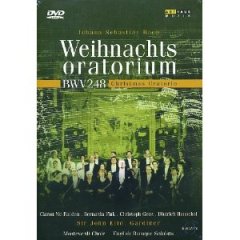Bach - Christmas Oratorio BWV 248 (Gardiner)
Bach - Christmas Oratorio BWV 248 (Gardiner)

For the First Day of Christmas 1. Mvt I 2. Mvts. II – IV 3. Mvts. V-IX For the Second Day of Christmas 4. Mvt I 5. Mvts. II – VIII 6. Mvts. IX – X 7. Mvts. XI – XIV For the Third Day of Christmas 8. Mvts. I – VI 9. Mvts. VII – X 10. Mvts. XI – XIII For the Feast of the Circumcision 11. Mvt I 12. Mvts. II – IV 13. Mvts. V – VII For the First Sunday in the New Year 14. Mvt I 15. Mvts II – V 16. Mvts VI-XI For the Feats of Epiphany 17. Mvt I 18. Mvts. II – VI 19. Mvts. VII - XI Bernarda Fink - mezzo-soprano Claron McFadden - soprano Dietrich Henschel - baritone Christoph Genz - tenor Monteverdi Opera Choir English Baroque Soloists Sir John Eliot Gardiner – conductor
The monumental Bach cantata pilgrimage by John Eliot Gardiner and his forces during 2000 was one of the most extraordinary musical undertakings of recent years. It all started in the Herderkirche in Weimar during December 1999, when two concerts devoted to the six cantatas that make up the Christmas Oratorio were presented on the 23rd and 27th respectively. This beautiful church, with its wonderful Cranach altarpiece, made for a particularly apposite venue in which to inaugurate the pilgrimage, being the place where both W. F. and C. P. E. Bach were baptized during the period of Bach’s service in Weimar (1708–1717).
In the first of the documentaries that accompany the set, Eliot Gardiner explains that he chose the Christmas Oratorio to inaugurate the pilgrimage because it shows Bach at his most infectiously joyous. It is also a work in which Gardiner has proved to excel, his 1987 Archiv audio recording having in the view of many (the present writer included) not been surpassed by any subsequent recording.
As he demonstrated throughout that memorable year in which he performed and recorded all the cantatas, Gardiner has not in any way been influenced by the new orthodoxy of performing Bach’s cantatas with a chorus of one voice to a part. He also persists with the now discredited practice of employing a harpsichord in addition to organ continuo in the arias. Yet, such is the burning conviction and obvious sincerity that informs this performance that all such considerations are largely swept aside. In so far as the chorus (here, if I counted correctly, 6–5–4–4) is concerned, it is the uncanny unanimity of attack and articulation of the Monteverdi Choir that convinces one that such relatively large forces can be successfully employed in Bach’s sacred works. One need only listen to the spine-tingling unison at the start of the opening chorus, “Jauchzet, frohlocket,” the thrilling contrapuntal entries in “Herr, wenn die stolzen,” the opening chorus of part 6, or the electrifying performance of the opening chorus of part 5 to be made aware afresh of the virtuoso quality of Gardiner’s magnificent choir. Yet, how tender, how freshly simple, they can also sound, as the chorale “Ich steh” (part 6) heartrendingly shows. Almost my only reservation about the performance also concerns an opening chorus, “Fallt mit danken” (part 4), one of the few numbers that Gardiner now takes more slowly than he did in 1987, not, in my view, to its advantage. It is worth mentioning at this point that Gardiner does make one gesture to authentic-period practice in asking his soloists to join in the choruses and chorales, a nice touch that involves them both vocally and emotionally in the performance to a far greater degree than is normally the case.
One of the reasons for the continuing superiority of the Archiv recording to its rivals is the superb line-up of soloists Gardiner assembled. Well, he’s done it again. Particularly in the case of the alto, tenor, and bass, Gardiner has come up with a team that not only equals, but also in some ways excels that remarkable earlier group. Never again did I expect to hear the exquisite alto lullaby “Schlafe, mein Liebster” (part 2), or the contemplatively lovely “Schliesse, mein Herze” (part 3) sung with such control of line, and tonal beauty as they were by Anne Sofie von Otter on the Archiv set. But now I have, and at present feel so overwhelmed by the inner peace that radiates from Bernarda Fink, both as to her singing and composure throughout the performance that I’m at a loss for further words. No less impressive are Christoph Genz and Dietrich Henschel. Genz, who sings both the Evangelist’s part and the tenor arias, performs throughout with a liquid fluency and attention to detail that leave the listener hanging on his every word, particularly those of the Evangelist, appropriately delivered from the pulpit without any visible sign of a score. He also copes splendidly with the cruel, quasi-instrumental coloratura of “Ich will nur” (part 4). Henschel is utterly commanding in the bass part, singing with a commitment, attention to diction and rhetorical power that excel even Olav Bär’s outstanding performance in the 1987 recording. If Claron McFaddon cannot quite live with such exulted company, hers is by any standard a fine performance, marred only by the slight metallic edge that has always prevented my wholehearted admiration of her singing.
The plaudits handed out to Gardiner’s chorus can be equally extended to the English Baroque Soloists, the precision and finesse of who’s playing would justify detailed comment. Space dictates that I must restrict myself to drawing attention to the many superb obbligato contributions made by the orchestra’s members. The sound and visual direction are both fine, the latter giving us a wide variety of shots of the performers, with occasional glimpses of the building, and nativity scenes. --- Brian Robins, arkivmusic.com
Last Updated (Tuesday, 06 August 2013 16:18)








